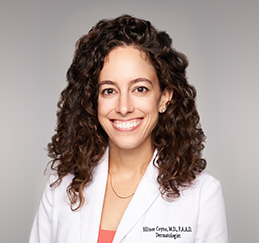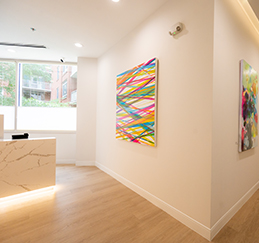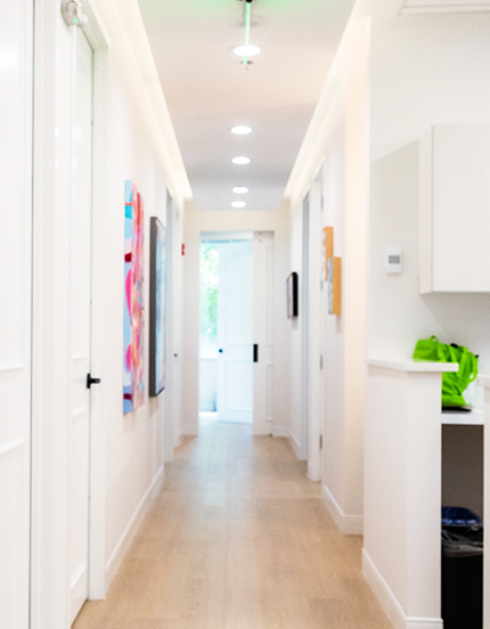Rosacea
If you tend to blush or lush more frequently—or even constantly—you may be dealing with rosacea. This condition is incredibly common. It is not contagious, but if left untreated,it can spread to a larger portion of the face or even start affecting new areas, such as the ears, chest, or back. Depending on the type of rosacea you have, you might also develop acne-like breakouts, a bumpy or uneven skin texture, thickening skin, swelling, or irritation of the skin or eyes. Thankfully, rosacea is a treatable condition. Arlington Dermatology tailors treatments to the exact symptoms and type of rosacea you’re dealing with so you can avoid unnecessary discomfort or self-consciousness.
What Causes Rosacea?
Dermatologists and scientific researchers have not determined a specific cause for rosacea. Some potential causes include:
- Genetics
- Immune system disorders
- Reactions to mites that live on the skin
- Improperly processing certain proteins
Further research is necessary to determine an exact cause for rosacea, but regardless of the condition’s cause, treatments are available.
What Types of Rosacea Are There?
There are four basic types of Rosacea. They are:
- Erythematotelangiectatic rosacea, which causes redness, flushing, and visible blood vessels, typically across the cheeks and nose. This can spread to the chin, forehead, ears, chest, or back as well.
- Papulopustular rosacea, which causes redness similar to the previous type as well as acne-like breakouts (papules or pustules).
- Phymatous rosacea, in which the skin becomes thick and develops a bumpy or rough texture.
- Ocular rosacea, which results in irritation and redness in the eyes and eyelid. This may also cause a bump or irritated area that looks like a stye.
Who Gets Rosacea?
Rosacea is very common. You may be more susceptible to rosacea if you fall into the following categories:
- Fair skin, especially with blond hair and blue eyes
- Between the ages of 30-50
- Celtic or Scandinavian ancestry
- Closely related to someone with rosacea or severe acne
- Personal history or sever acne, especially cystic acne or nodules
Women are also more likely to have rosacea from men, but men more commonly face severe rosacea if they have it.
While people who fall into these categories are more likely to experience rosacea, you can still deal with the condition regardless of your age, ancestry, or race.
Why Treat Rosacea?
It’s important to treat rosacea because it’s possible to develop more severe symptoms over time. For example, those with rosacea may develop thick, bumpy, or rough skin, which can be more difficult to treat as it progresses. This can lead to a condition known as rhinophyma, in which the sebaceous glands on the nose are enlarged, causing the nose to become extremely red or purple and distorting the nose to an enlarged, disproportionate shape.
At any stage, rosacea can also cause discomfort, so it’s important to seek care from a dermatologist to relieve these symptoms. Typically, rosacea also means that your skin is more sensitive to sunlight, so a dermatologist can help you manage the condition and protect your skin from excess sun exposure and the damaging effects of UV rays.
Finally, it’s helpful to see a qualified, educated dermatologist to rule out any other conditions which can be more serious than rosacea. You may believe you have rosacea but are actually suffering from a condition such as lupus or an allergy instead.
How Can I Prevent Rosacea?
Often, those with rosacea experiences flares due to various triggers. Some common triggers include:
- Overheating
- Cold wind
- Eating spicy foods
- Stress
- Makeup, skin care, or other personal care products
- Certain medications
Over time, you will likely begin to narrow down a list of triggers that affect your rosacea, and can avoid them as much as possible. Your dermatologist can help you identify your rosacea triggers as well.
How Can I Treat Rosacea?
After determining your triggers and helping you avoid them, your dermatologist will also make suggestions regarding sun protection and an effective at-home skincare routine to minimize your rosacea symptoms. Professional treatment depends on your symptoms, and treatments are customized to suit your unique needs. Your dermatologist may suggest:
- Laser treatments to reduce redness or vascular issues
- Topical treatments such as Brimonidine or oxymetazoline for redness
- Acne treatment such as azelaic acid, topical retinoids, or oral antibiotics
Schedule an Appointment
Whether you have recently developed redness on your face or have dealt with rosacea for years and have more severe symptoms, the board-certified dermatologists at Arlington Dermatology can help with a tailored, effective treatment plan. To schedule your appointment at Arlington Dermatology, call our office or contact us online.



